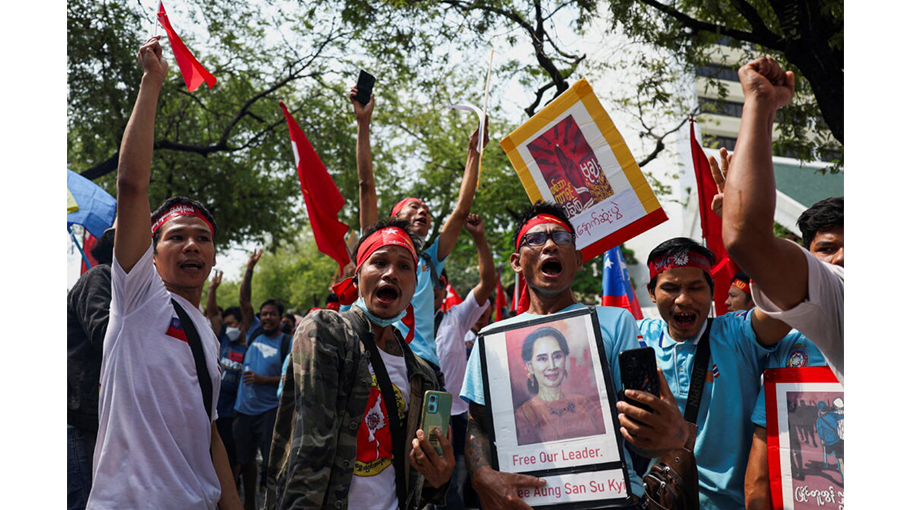Myanmar remains off the international legal agenda

Alison McCook
In May, the International Criminal Court (ICC) issued arrest warrants for Israeli and Hamas leaders. This followed a similarly swift response by the ICC to Russia’s invasion of Ukraine. It also comes alongside the initiation of legal action before the International Court of Justice (ICJ) by Ukraine against Russia and by both South Africa and the UN General Assembly for the Palestine crisis.
In the face of stagnating cases and broad disillusionment with the capacity of international courts, these cases have been seen as revitalising international courts’ standing. Despite some criticism, the ICC and ICJ have generally been lauded for their ability to respond swiftly and proactively, including ordering provisional measures within months of each conflict’s inception.
The courts’ central position in these crises, and the view that international law has a role to play in their resolution, stand in stark contrast to the situation in Myanmar. Since the coup initiated by the Tatmadaw — the Armed Forces of Myanmar — in February 2021, widespread atrocities have been committed against civilians including mass murder, torture and air strikes targeting civilians. But international courts appear paralysed — the ICC prosecutor has not sought any warrants, and no cases have been brought to the ICJ since the coup. While two proceedings in the ICC and ICJ related to Myanmar’s Rohingya crisis are ongoing, they do not extend to other crimes committed during the civil war.
Both legal complexities and geopolitical challenges diminish the chances of legal accountability in Myanmar for the foreseeable future. First, the numerous parties to Myanmar’s civil war make it difficult to legally categorise the conflict. Unlike in Palestine or Ukraine, the conflict is not between two states, or one state and a quasi-state. The junta is opposed by various groups including democracy advocates, the National Unity Government (NUG) representing the former government, the People’s Defence Force — the NUG’s armed wing — and numerous ethnic armed organisations. The junta’s brutal crackdown has been widespread, targeting various resistance forces and ethnic groups.
This complexity seriously obstructs the imposition of international law. The Genocide Convention only applies to crimes committed against a specific ‘national, ethnical, racial or religious group’. Most of the junta’s crimes are unlikely to fall within that definition. Plus, unlike in Ukraine, and perhaps Palestine, the legal rules that apply to conflicts between States — like the prohibition on the use of force — don’t apply to conflict between the junta and ethnic armed groups or civilians.
The stark contrast between the role of international law in the Ukraine and Palestine crises and in Myanmar can also be explained by various geopolitical factors, including a general ambivalence towards the compulsory application of international law by Myanmar and other regional States, and Russia and China’s continued engagement with the junta.
The ICJ’s jurisdiction is generally contingent on parties’ consent, whether under a treaty or through agreement to the Court’s jurisdiction. Myanmar is recalcitrant in its engagement with international law. It has signed only four of the nine core human rights conventions and excluded the ICJ’s jurisdiction to decide disputes under the only of those four conventions that include a judicial dispute settlement mechanism. This severely limits the scope of the issues for which Myanmar can be held accountable at the ICJ.
Similarly, the ICC has jurisdiction under the Rome Statute to prosecute individuals where crimes are committed by a national of a State party, in a State party’s territory, or a State has accepted the ICC’s jurisdiction on an ad-hoc basis. None of these criteria apply in Myanmar, which has not accepted the ICC’s jurisdiction and, like most of its neighbours, is not a State party. Only 31 per cent of UN Member States in the Asia Pacific are parties, compared to 61 per cent in Africa and 83 per cent in Eastern Europe.
The ICC can also act where crimes are referred to it by the UN Security Council. China and Russia — who maintain diplomatic relations with the junta — would likely veto any such referral. Security Council meetings on the situation have largely been closed, with just three open meetings in three years. Since the coup, it has passed one resolution demanding an end to the conflict, from which China and Russia abstained. Their position has been justified by an aversion to the use/‘misuse’ of binding international law. In April, Russia decried calls for the ICC and ICJ’s involvement as an ‘unacceptable’ attempt to ‘exploit existing objective difficulties’.
The lack of international legal avenues for redress in Myanmar is compounded by the dim prospects for domestic accountability. Even before the 2021 coup, Myanmar’s judicial system was regarded as inefficient and deeply corrupt. Immediately after the coup, the junta replaced civilian judges on the Supreme Court with military affiliates. Myanmar’s domestic human rights framework is also weak — it has largely failed to enshrine any of the four signed human rights treaties in domestic legislation, making those rights generally unenforceable in national courts. Constitutional protections are weak and limited in scope.
The ICC and ICJ’s actions in the Israel–Palestine and Russia–Ukraine crises serve to highlight Myanmar’s increasing legal isolation. While both courts take a central role in those situations, Myanmar remains without any real prospect of international accountability.
Alison McCook is an associate at the Supreme Court of the Australian Capital Territory and a Research Affiliate of the Centre for International and Public Law at The Australian National University. The views expressed in this article are the author’s own and do not represent the views of their employer.
Source: East Asia Forum




